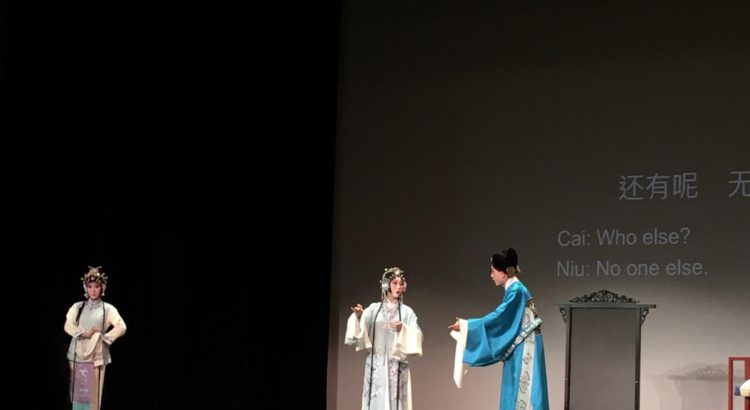The grand finale of the Confucius Institute was the best show I have seen in all my four years at Michigan. I appreciate the Confucius Institute for making my experience at U of M much more cultural and special, and congratulate them on all their success on U of M’s campus.
Chinese operas are more comprehensive than western operas because of the emphasis on movement and acting in addition to music and singing. These actors train their whole lives to be able to express subtle but deep emotions in their movements. I love how precise the movements align with the percussion and cymbals. Even when the actors were not moving they would stand in a beautiful pose flaunting their hands by elegantly contorting their fingers. Some other major differences between Western and Chinese opera include: Chinese opera has limited facial and mouth movements when actors sing, most of the singing from both male and female characters is an extremely high pitched falsetto, and the most important part of the clothing/costume is the sleeves. The costumes are extravagant. Dainty, light, silky, colorful dresses and robes combined with beautiful makeup and jewelry lining their hair. The male characters all had a feminine look to them because of the intense makeup and lack of facial hair. Still, sleeves are the most characteristic part of their clothes because of how the actors use their sleeves. Sleeves usually covering their hands would fly inward and outward with precision and control. The actors would twirl the sleeves occasionally allowing a glance at their fingers.
The plot was extremely Chinese because it was all about filial piety. It was a depressing story about a failed son without a happy ending. Still, this play was surprisingly comical. Cai BoJie often had me laughing, especially when he interacted with Lady Niu. Besides the irony and intended comedy in their scene together, something about how respectful and orderly he was to Lady Niu was funny. Maybe it was the juxtaposition of his esteemed attitude and his melancholy feelings. Maybe it was how unnatural their relationship felt having to address each other as “honored lady/husband”. One thing for sure is that the movements in Chinese opera give a sense of comedy vacant in Western operas or American musicals because we don’t have to wait for a joke to laugh, the subtle movements of the actors do the work.
The acting of the characters was truly incredible. Cai Bojie did a great job acting sorrowful and regretful. No matter what he was doing he always seemed conflicted. The scene where he was on his knees mourning his parents death was riveting. WuNiang was an incredible actress as well. Wuniang had a persistent look of worry the entire play. This showed the hardships she had been through and helped the audience understand the depth of her depression. The most comical character was the monk in the temple. He had a silly face and was constantly laughing. His singing sounded more like a fools chant than a monk reciting a prayer or sutra. I am curious if this was a commentary on monks? The monk seemed to care more about sucking up to Cai Bojie than actually performing rituals. Seeking money and donation must be his first priority.
Music is a central component of the story. It is through music that characters displayed their true emotions. The most beautiful music was when WuNiang told her tale through the pipa. In fact, this play is named after the pipa, lute means pipa in English. My favorite sounds besides the instruments were when the actors would laugh or cry.
My favorite scene was scene 3. It was interesting that Lady Niu wanted to fervently punish Cai BaoJie when it was WuNiang who had to endure all the hardships because of Cai BaoJie. Yet, WuNiang didn’t want any vengeance on Cai BoJie and was willing to go back and mourn for another twelve years. The best part was when WuNiang revealed the name of Cai BoJie and she and Lady Niu simultaneously shrilled. All of a sudden they started to mimic each other, even slouching in the same manner.
This was a once in a lifetime treat that I will never forget; being able to see a first-class Chinese opera, in the front row and with English subtitles.






